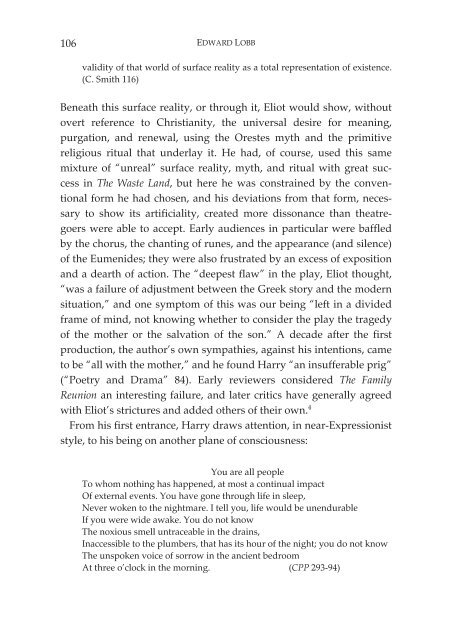Connotations 18.1-3 (2008/2009)
Connotations 18.1-3 (2008/2009)
Connotations 18.1-3 (2008/2009)
You also want an ePaper? Increase the reach of your titles
YUMPU automatically turns print PDFs into web optimized ePapers that Google loves.
106<br />
EDWARD LOBB<br />
validity of that world of surface reality as a total representation of existence.<br />
(C. Smith 116)<br />
Beneath this surface reality, or through it, Eliot would show, without<br />
overt reference to Christianity, the universal desire for meaning,<br />
purgation, and renewal, using the Orestes myth and the primitive<br />
religious ritual that underlay it. He had, of course, used this same<br />
mixture of “unreal” surface reality, myth, and ritual with great success<br />
in The Waste Land, but here he was constrained by the conventional<br />
form he had chosen, and his deviations from that form, necessary<br />
to show its artificiality, created more dissonance than theatregoers<br />
were able to accept. Early audiences in particular were baffled<br />
by the chorus, the chanting of runes, and the appearance (and silence)<br />
of the Eumenides; they were also frustrated by an excess of exposition<br />
and a dearth of action. The “deepest flaw” in the play, Eliot thought,<br />
“was a failure of adjustment between the Greek story and the modern<br />
situation,” and one symptom of this was our being “left in a divided<br />
frame of mind, not knowing whether to consider the play the tragedy<br />
of the mother or the salvation of the son.” A decade after the first<br />
production, the author’s own sympathies, against his intentions, came<br />
to be “all with the mother,” and he found Harry “an insufferable prig”<br />
(“Poetry and Drama” 84). Early reviewers considered The Family<br />
Reunion an interesting failure, and later critics have generally agreed<br />
with Eliot’s strictures and added others of their own. 4<br />
From his first entrance, Harry draws attention, in near-Expressionist<br />
style, to his being on another plane of consciousness:<br />
You are all people<br />
To whom nothing has happened, at most a continual impact<br />
Of external events. You have gone through life in sleep,<br />
Never woken to the nightmare. I tell you, life would be unendurable<br />
If you were wide awake. You do not know<br />
The noxious smell untraceable in the drains,<br />
Inaccessible to the plumbers, that has its hour of the night; you do not know<br />
The unspoken voice of sorrow in the ancient bedroom<br />
At three o’clock in the morning. (CPP 293-94)

















